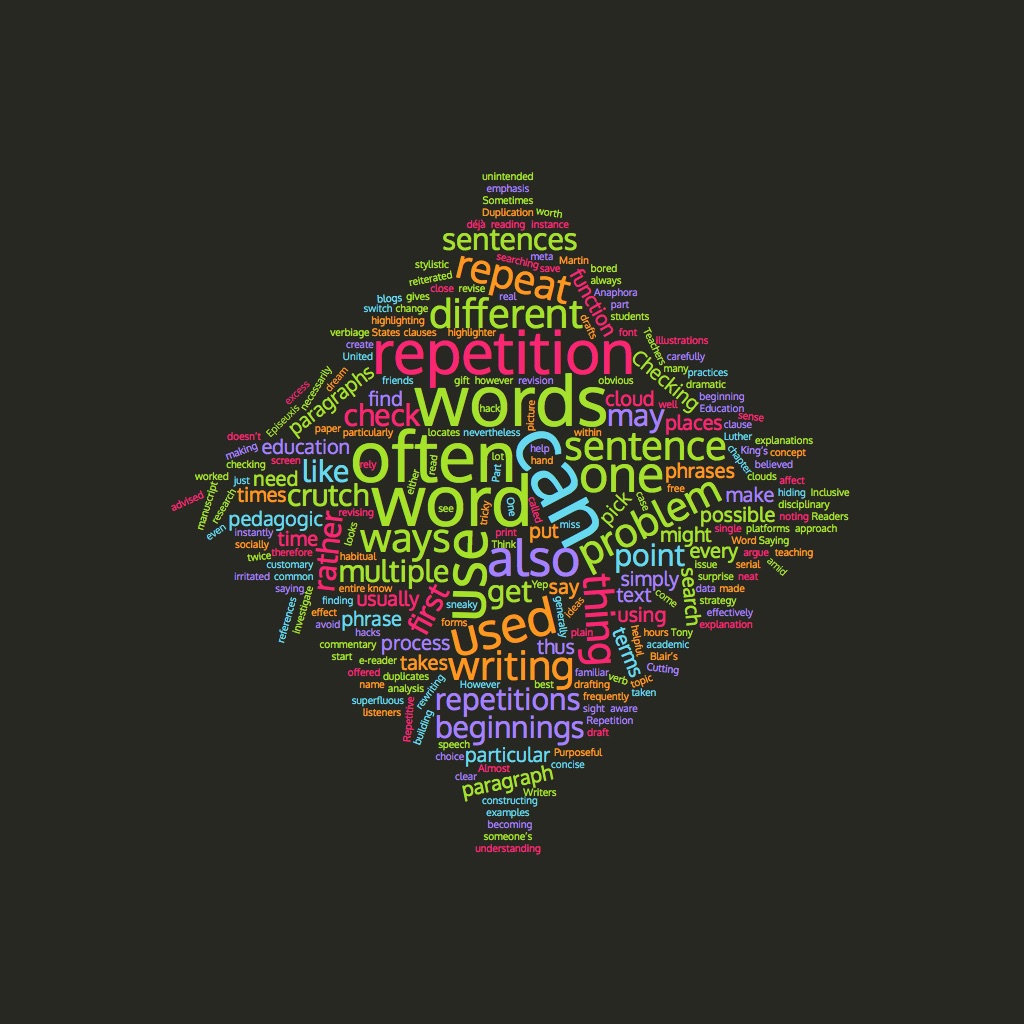Do you repeat yourself? Most of us do. It’s not unusual.
Repetitive writing takes many forms – several sentences that say the same thing using different words, a word or phrase used over and over, paragraphs and sentences that have identical beginnings, one point made multiple times using different examples.
But repetition is not necessarily a problem. Purposeful repetition can be a stylistic choice. Rhetorical theory for example lists anaphora – the repetition of a word of phrase at the beginning of a sentence or clause used to create dramatic emphasis and affect. Think of Martin Luther King’s “I have a dream” speech in which poetic reiteration built up a picture of a possible future, a socially just United States. There’s also episeuxis – the serial repetition of word, usually within the same sentence – as in Tony Blair’s “Education, education, education.”
Repetition can also be integral to a professional practice. Teachers for example deliberately repeat themselves. Saying the same thing in different ways is a pedagogic strategy which gives students varied ways into a topic, gives options for understanding a concept or process. Inclusive teaching practices rely on multiple illustrations and explanations. And restatement is an approach often taken in pedagogic blogs like this one – I often say the same thing a few times in different ways, in case my first explanation doesn’t make things clear.
But repetition can also be a problem. Readers and listeners get bored and switch off when hearing or reading what rapidly becomes the same old same old. They may even get irritated if it takes them a while to find the point amid the verbiage. Writers are thus always advised to revise by checking for unintended repetition. Cutting out the déjà vu effect is part of becoming concise – making the point as simply and effectively as possible.
So to revision. You may be aware of some of the places in your writing where you repeat yourself. I often repeat someone’s name at the start of every paragraph when writing references. Dr X does this. Dr X is, Dr X worked for me and … Because I know I do this, I can check my first draft for this particular problem. And another of my first draft problems, I often use superfluous sentence beginnings – It is clear that, it is worth noting that … and I know to look for these false starts during the revision process.
Checking sentence and paragraph beginnings can quickly locate some repetitions. However, it’s not always so easy. Searching for repetition can be tricky. Part of the problem is that we often use what are called “crutch” words – single words, phrases or clauses that are habitual. We use “crutch words” in drafting because they help us get the ideas down. Because they are so familiar, we often miss them when we come to revise.
Checking by reading aloud for “so, but, therefore, thus, nevertheless, however, on the one hand, not only but also” may pick up places where you need to get rewriting. You can also print out your text, using a highlighter every time you find a sneaky “crutch”. You might alternatively use the search function in Word. Searching is particularly helpful when checking for repeated common research terminology as well as specific disciplinary terms.
Duplication can be a real issue when composing the meta commentary used in academic writing – we might use the verb “argue” or “investigate” rather too often in a few paragraphs. Sometimes you can pick most of the repetitions hiding in plain sight if you change your font, or put your manuscript into an e-reader rather than read it on your customary screen.
However – and here is the point of this post – there is a short cut. As the illustrations suggests, one of the very best hacks for finding duplicates and repetitions is to make a word cloud. What a gift it is to put an entire chapter or paper into one of those free platforms that looks for either words or phrases. Almost instantly you can see what terms are used most frequently. If there are any that are a surprise, or are used rather more than you would like, you can then simply use the search function in word to check for each one. Word clouds can save hours of reading and highlighting. Yep, a word cloud can be one of your close revising friends.
Word cloud made from the first draft of this post.

